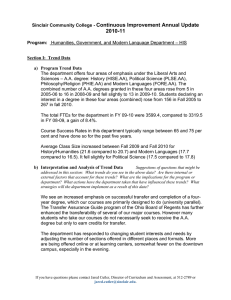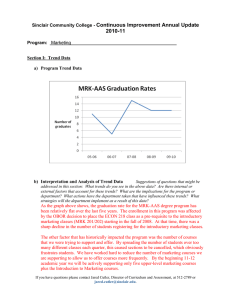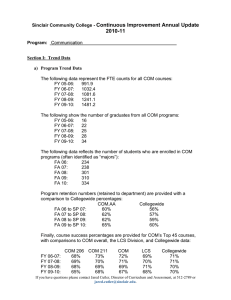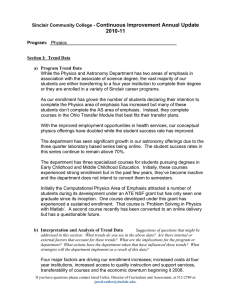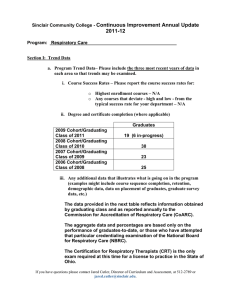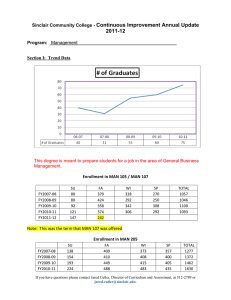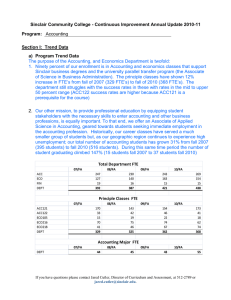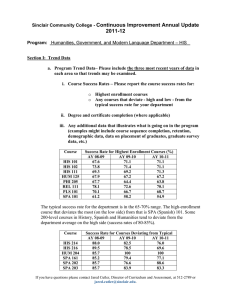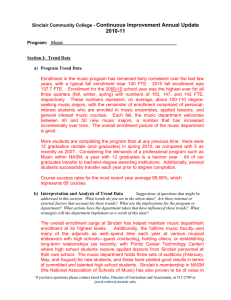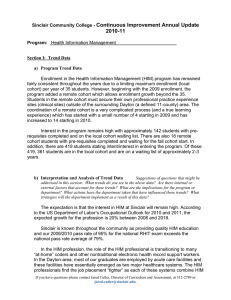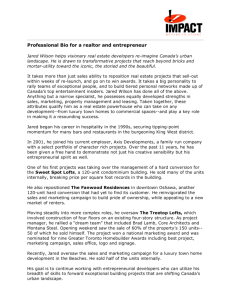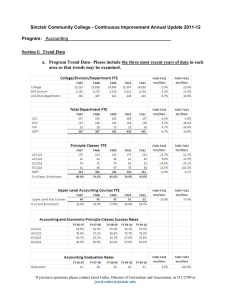Continuous Improvement Annual Update 2010-11
advertisement
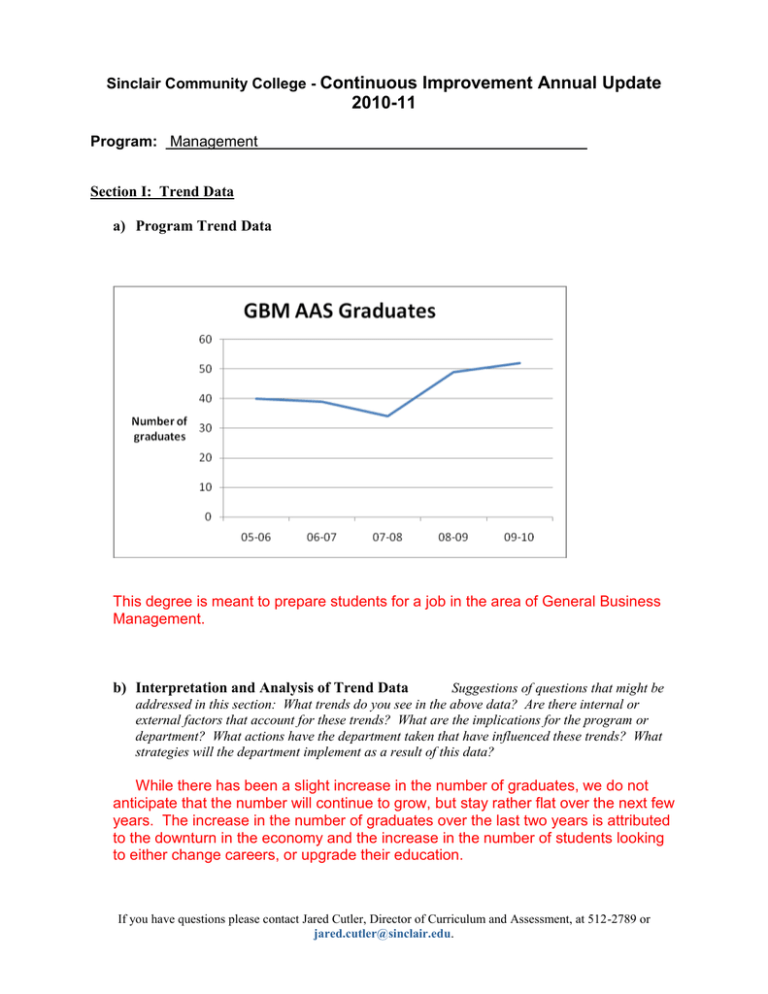
Sinclair Community College - Continuous Improvement Annual Update 2010-11 Program: Management Section I: Trend Data a) Program Trend Data This degree is meant to prepare students for a job in the area of General Business Management. b) Interpretation and Analysis of Trend Data Suggestions of questions that might be addressed in this section: What trends do you see in the above data? Are there internal or external factors that account for these trends? What are the implications for the program or department? What actions have the department taken that have influenced these trends? What strategies will the department implement as a result of this data? While there has been a slight increase in the number of graduates, we do not anticipate that the number will continue to grow, but stay rather flat over the next few years. The increase in the number of graduates over the last two years is attributed to the downturn in the economy and the increase in the number of students looking to either change careers, or upgrade their education. If you have questions please contact Jared Cutler, Director of Curriculum and Assessment, at 512-2789 or jared.cutler@sinclair.edu. Section II: Progress Since the Most Recent Review a) What was the fiscal year of the most recent Program Review for this program? 2005-06 b) Briefly summarize the goals that were listed in Section IV part E of the most recent Program Review Self-Study (this section of the Self-Study asks “What are the department’s/program’s goals and rationale for expanding and improving student learning, including new courses, programs, delivery formats and locations”)? As faculty within the Marketing and Management department, we challenge ourselves to demonstrate, through words and actions, how one manages time, events, people, resources and markets products and services in our fast-based, changing global economy. In a true sense, we want to provide student learning through, and by, example. We understand, as a faculty, the fragile nature of many of our students and we strive to provide not only academic improvement but improvement in self-esteem, maturity and organizational savvy. To this end, we look for technologies, pedagogies, resources and methods that will provide the student with the learning they need and deserve. This requires an almost continual scanning of our environment and communication with our stakeholders to ensure new methods are considered, piloted, and adopted. To this end, our faculty serve on many external boards and committees, update their skills through seminars/workshops and practice business skills through many avenues within the community. c) Have these goals changed since your last Program Review Self-Study? If so, please describe the changes. These goals have not changed since the last Program Review Self-Study. d) What progress has been made toward meeting any of the goals listed above in the past year? We realized a major issue we had as a department was that we did not have the right people on our advisory board. Two years ago we began the process of finding the right people and we revamped the board. We now believe we have the right people, with the right skills on board. The first order of business with the new board was to revisit our program outcomes. The board recommended major changes to the outcomes based on the needs of employers in today’s job market. As a result, we have completely rewritten the program outcomes based on the input of the advisory board. With this new direction, we then focused on the course outcomes as we started through the semester conversion process. During this process we looked at the technologies, pedagogies, resources and methods that were being used in the classroom. All courses now have a variety If you have questions please contact Jared Cutler, Director of Curriculum and Assessment, at 512-2789 or jared.cutler@sinclair.edu. of these tools that all full-time and adjunct faculty have at their disposal when teaching any of the classes within Management. e) What Recommendations for Action were made by the review team to the most recent Program Review? What progress has been made towards meeting these recommendations in the past year? Use advisory committee more extensively to inform, guide, and validate program improvements As stated above, the advisory board was revamped to get the right people, with the right skills, sitting in the right seats. We now have a very active and energized advisory board that clearly understands what we are trying to do, and how they can help us get there. During the last year, we completely revised the program outcomes and have filtered those down to the course level through the semester conversion process. Continue to improve departmental professional development for part-time faculty members and potential faculty members (e.g., recent retirees) We have held several training sessions for our adjunct faculty members including training sessions on the ANGEL grade book and attendance manager, the new program outcomes and how they tie back to course outcomes, classroom expectations, etc. We now require the adjunct certification course for all new adjuncts, as well as on-line certification for anyone teaching on-line classes. Additionally, several of the full-time faculty completed these courses as well. Shift the assessment of program outcomes from knowledge based to application, incorporating other higher order thinking skills The Management Capstone course (MAN 279) was revised for the move to semesters, and to better align it with the newly developed program outcomes. The course now requires students to work in groups to analyze an organization within the Baldrige framework and the Triple Bottom Line. Students then develop and give a presentation of their work. Previous to this, students were exposed to the dynamics of group work, but were not applying that learning in a meaningful way. Section III: Assessment of Outcomes The Program Outcomes for this program are listed below. At least one-third of your program outcomes must be assessed as part of this Annual Update, and across the next three years all of these program outcomes must be assessed at least once. If you have questions please contact Jared Cutler, Director of Curriculum and Assessment, at 512-2789 or jared.cutler@sinclair.edu. Management Program Outcomes 1) Demonstrate ability to understand methods of planning, leading, organizing, and controlling within organizational systems and strategy development, particularly in the context of mission, values, goals, and objectives. 2) Apply principles of organizational behavior and human relations, including methods used to create, maintain, and improve a positive and diverse work environment. 3) Apply contemporary approaches to management and organizational success within the framework of the classroom and written assignments. 4) Apply proper oral and written communication, quantitative methods, critical thinking, research, ethics, and computer literacy, and global citizenship skills. In which courses are these program outcomes addressed? MAN 1107, MAN 2150, MRK 2101, MAN 1110, MAN 2279, MAN 2270, MAN 2101 MAN 2150, MAN 1107, MAN 2279 MAN 2150, MAN 1107, MAN 2279, MAN 1110, MAN 2159, ECO 2180, ECO 2160, LAW 1101, MAT 1260, MAT 2060 ACC 1210, ACC 1220 MAN Elective MAN 2279, COM 2211, BIS 1120, , ENG 1101, ENG 1201, ENG 1131, HUM Elective, Natural Science Elective Which of these program outcomes were assessed during the last fiscal year? Assessment Methods Used a) For the assessment methods listed in the table above, what were the results? What changes are planned as a result of the data? How will you determine whether those changes had an impact? Measureable program outcomes that are aligned with the move to semesters were developed, and are being implemented. Once the program outcomes were in place, the course outcomes were reviewed and revised as part of the semester conversion process. While we do not have meaningful data yet to review the impact of these If you have questions please contact Jared Cutler, Director of Curriculum and Assessment, at 512-2789 or jared.cutler@sinclair.edu. changes, we will continue to monitor the outcomes and make the appropriate adjustments. b) What other changes have been made in past years as a result of assessment of program outcomes? What evidence is there that these changes have had an impact? Since we have just changed the outcomes as part of the semester conversion process, we have not made any other changes as a result of assessment of program outcomes. c) Describe general education changes/improvements in your program/department during this past academic year (09-10). After looking at the results students were producing in the MAN 279 capstone course, it was clear that the students were not prepared in the areas of oral presentation and critical thinking skills. As a result, there has been assignments added to MAN 279 that require the students to not only demonstrate their critical thinking skills, but to prepare and present the results. At this point, it is too early to have any meaningful data to present. If you have questions please contact Jared Cutler, Director of Curriculum and Assessment, at 512-2789 or jared.cutler@sinclair.edu. Section IV: Improvement Efforts for the Fiscal Year a)FY 09-10: What other improvement efforts did the department make in FY 09-10? How successful were these efforts? What further efforts need to be made? If your department didn’t make improvement efforts during the fiscal year, discuss the strengths and weaknesses of the department over the last year and how the department plans to address them in the coming year. The department has worked closely with full-time faculty, adjuncts, and academic advisors to ensure that students understand the difference between the Business AS and AAS degrees. This was identified as an area for action from the 08-09 Program Review. During the adjunct training sessions that were held during the last year, we have stressed the difference between the two degree programs, and have requested that the information be shared with students during the initial class session of each quarter for the lower level classes. The department has also worked closely with the Tech Prep office to not only develop clear pathways for transfer to four year institutions, but also to increase the success rate of students in the Tech Prep program. IT is too early to tell how successful this effort has been, but we are continuing to monitor the progress and make changes as needed. A real strength of the department is the faculty team. We have a strong group of dedicated individuals that are committed to continuously improving the program to provide our students with the best education possible. During this timeframe, the entire degree program was put on-line, giving our students more options to complete their degree and to be successful. b)FY 10-11: What improvement efforts does the department have planned for FY 10-11? How will you know whether you have been successful? Several key courses within the program are being consolidated in preparation for the conversion to semesters. For Fall 2011, the MAN 205 (Principles of Management) and MAN 225 (Organizational Behavior) are being combined to form a new MAN 250 course. This course will more closely align with courses offered at the four year institutions. MAN 105 (Introduction to Business) and ENT 105 (Introduction to Entrepreneurship) are being combined to form a new MAN107 course which will be offered in Fall 2011 as a 5 credit hour course. Additionally, MAN 241 (Introduction to Supply Chain Management) and MAN 242 (Advanced Supply Chain Management) are being combined into MAN 249 which will also be a 5 credit hour course. All of these course conversions will position the department for the move to semesters in 2012. We are also added an RFID Certificate program in cooperation with the Engineering Division. The certificate will consist of both MAN and EET courses and will prepare students to work either designing, or implementing and maintaining an RFID system. If you have questions please contact Jared Cutler, Director of Curriculum and Assessment, at 512-2789 or jared.cutler@sinclair.edu. Success of these initiatives will be accomplished through assessment at the course level as listed above for the program outcomes, and also by reviewing enrollment numbers for the RFID Certificate. Questions regarding completion of the Annual Update? Please contact the Director of Curriculum and Assessment at 512-2789 to schedule a time to review the template and ask any questions. If you have questions please contact Jared Cutler, Director of Curriculum and Assessment, at 512-2789 or jared.cutler@sinclair.edu.
